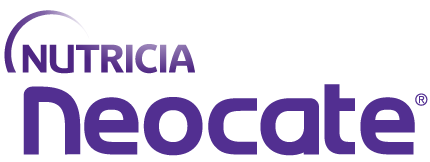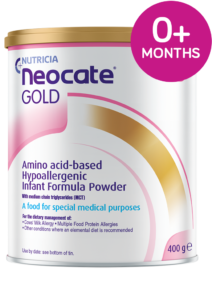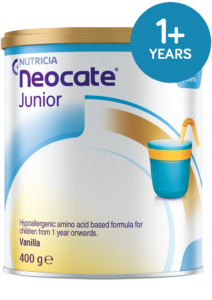What is cows’ milk protein allergy?
Key takeaways
- Types of cows’ milk protein allergy can include immediate/rapid (IgE mediated) or delayed reactions (non-IgE mediated) that can appear up to a few hours or days after consumption of the allergen.
- Common symptoms can include an increase in eczema, vomiting or diarrhoea
- Avoidance of cows’ milk protein is necessary for the management of confirmed cows’ milk protein allergy

Cows’ milk protein allergy is a common food allergy in infants and children. In Australia and New Zealand, around 2% of infants are allergic to cows’ milk and dairy products.1 Cows’ milk protein allergy occurs when the immune system over-reacts to one or more proteins present in cows’ milk.
Most infant formulas are based on cows’ milk, so bottle-fed infants are likely to be exposed to cows’ milk protein at a very early age. Cows’ milk is also commonly consumed throughout childhood as part of a balanced diet. Therefore, children that have cows’ milk protein allergy, will often develop symptoms very early on.
Occasionally, exclusively breast-fed infants may also have an allergic reaction to cows’ milk protein. This is due to the cows’ milk protein consumed in the mother’s diet, passing through the breast milk, from mother to infant. In this situation, the mother may be required to eliminate dairy and foods containing cows’ milk protein from her diet, however, this should be done under advice from your medical specialist to ensure that appropriate dietary substitutions are included to meet your nutritional needs.1
The symptoms of cows’ milk protein allergy are varied and may affect many parts of the body. When a child with a cows’ milk protein allergy consumes cows’ milk it triggers the body’s immune system to have an allergic reaction. This can cause symptoms that affect the skin, breathing and/or digestive system. There are two types of allergic reactions, these are IgE mediated or non-IgE mediated.
Rapid onset allergic reactions are called IgE mediated and can occur within 15 minutes after consuming cows’ milk or dairy products. Symptoms may include one or more of the following:
- Mild to moderate symptoms can include skin rash (hives), swelling of lips, face or eyes, vomiting or diarrhea.1
- Severe symptoms can include severe breathing problems, wheezing, tongue swelling, throat swelling, hoarse voice, loss of consciousness or floppiness. If you notice any of these severe symptoms in your infant, then it could be anaphylaxis. This requires immediate medical care and is an emergency.1
Delayed (non-IgE mediated) reactions to cows’ milk may take up to several hours to days to appear after consumption of the allergen.1 Symptoms may include an increase in eczema, delayed vomiting and/or diarrhea.1
Complete avoidance of cows’ milk protein and dairy products is the only treatment for cows’ milk allergy. If you are concerned that your child may have cows’ milk protein allergy, then it is best to speak with your healthcare professional to discuss symptoms and possible diagnoses.
It is important to not exclude foods from your infant’s diet without consultation with a healthcare professional.
Cows’ milk protein allergy is a common food allergy in infants and children. In Australia and New Zealand, around 2% of infants are allergic to cows’ milk and dairy products.1
The Symptoms Checklist
If you have found one or more symptoms mentioned in the article above match with what your child is experiencing, the questions listed in the Symptom Checklist may help you to find out if cows’ milk protein allergy could be a potential cause.The results of the Symptom Checklist should be discussed with your child’s treating healthcare professional to determine appropriate diagnosis and management options.
This article and the Symptoms Checklist are not intended to be a substitute for medical advice. Always consult your doctor.
Donwload ChecklistReferences:
- Australasian Society of Clinical Immunology and Allergy (ASCIA). Cows’ milk (dairy) allergy 2019. Available from: http://www.allergy.org.au/patients/food-allergy/cows-milk-dairy-allergy (Accessed June 2021).






